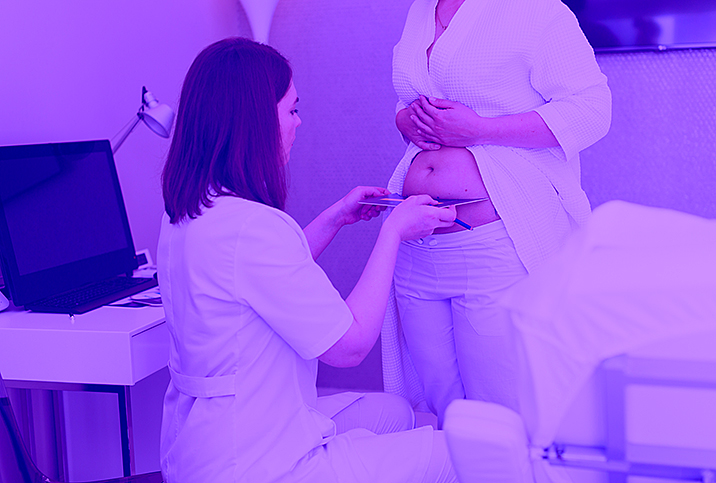The Complexities of Gender and Reproductive Health

Reproductive health is a complex and multifaceted topic that encompasses a wide range of issues related to sexual and reproductive well-being. While reproductive health concerns impact individuals of all genders, it is vital to acknowledge that gender plays a significant role in shaping reproductive experiences and outcomes.
From access to healthcare to expectations around fertility and parenthood, gender considerations intersect with reproductive risks in ways that impact our physical, emotional and social well-being.
Let's explore reproductive health with regard to different genders, highlighting some of the unique factors to consider when looking after your reproductive health. By understanding the unique challenges and considerations facing individuals of different genders, we can better support reproductive health and well-being for all.
Female reproductive health
Reproductive health pertains to all matters of the reproductive system and its functions and processes, which for women encapsulates puberty, menstruation, fertility, pregnancy, potential reproductive health problems such as endometriosis and polycystic ovary syndrome (PCOS), contraception, safe sex, and reproductive cancers, such as cervical cancer.
That's not an exhaustive list; depression, mental health, antenatal and postpartum depression, pleasure, autonomy, respect and consent must all be included.
Reproductive health is a vital element of overall physical and mental health. Sadly, there are inequalities and disparities in women's health, said Hana Patel, M.B.B.S, a general practitioner and mental health coach in London.
"Some people from certain backgrounds feel that they cannot speak to their healthcare provider about their health concerns, such as those related to contraception, pregnancy and menstrual health," Patel said.
Black women are three times more likely to die from pregnancy-related causes than white women, and while white women are more likely to have breast cancer, Black women are more likely to die from the disease.
These disparities are due to many factors, such as structural racism, implicit bias, social determinants and vast variations in equal access to quality healthcare.
Women should seek support from a doctor who they feel is safe to have an open and honest consultation with, Patel said. If you see a doctor and don't think they are listening to you, look for another clinician you trust. Recommendations from family and friends who have had a good experience can be a great place to start.
As every woman's menstrual cycle is unique, paying attention to any changes or irregularities in your menstrual cycle is important. Some common worrisome symptoms women should look for include the following:
- Heavy or prolonged bleeding
- Severe cramps
- Irregular cycles
- Missed periods
- Abnormal vaginal discharge
Other symptoms to look for include nausea, vomiting, fatigue, mood changes, pain during or after sex, and bleeding in between periods or after menopause. By tracking your menstrual cycle and being mindful of any changes or symptoms, you can help promote reproductive health and identify any potential issues early.
Women should start having cervical screening tests, also known as Pap tests or Pap smears, when they reach the age of 21. If results are normal, you should continue to have cervical screening tests every three years until the age of 65. You may need more frequent screening if there is a concern with your results.
The frequency and timing of screening may vary based on individual risk factors, such as a history of abnormal Pap tests or a weakened immune system.
Discuss your individual screening needs with your healthcare provider, who can provide personalized recommendations based on your medical history and other factors. Regular cervical screening tests are crucial for detecting and preventing cervical cancer, as they can identify abnormal cells in the cervix before they develop into cancer.
If you have a question or concerns about menstrual health, general health, well-being, cervical screening, STI/STDs, perimenopausal symptoms, or any reproductive health issues, have a discussion with your doctor in case there are underlying undiagnosed health problems that need to be excluded, Patel said.
Male reproductive health
Too often, men tend to overlook reproductive health and associate the term with women. However, it's essential to men's overall health and well-being.
Men should regularly perform testicular self-exams to check for abnormalities or lumps that may indicate testicular cancer, said Justin Houman, M.D., a reproductive urologist and men's health specialist at Tower Urology in Los Angeles and the medical director for Bastion Health, an app-based telehealth platform for men.
It's straightforward and quickly done in a warm shower where your testicles can relax and drop away from the body, making them easy to examine. With your thumb and finger, roll one testicle around and check for any changes or anything painful. Then do the same with the other testicle. The more you check (once a month is recommended), the more you get to know your own testicles so you can pinpoint anything abnormal.
Prostate cancer is one of the most common types of cancer in men, Houman said, which makes getting that part of your body checked regularly crucial as well.
"Regular screening and monitoring can help detect prostate cancer early," Houman said. "So it's good to get regular check-ups with a healthcare provider to monitor reproductive health and identify potential problems early on. This will also help identify and monitor any fertility concerns. Infertility affects men as well as women and can be caused by a variety of factors, including low sperm count, sperm motility issues and hormonal imbalances."
There is no perfect time to check your fertility, but Houman said to seek support if you've been struggling for six or more months to achieve your reproductive goals. He said there are several tests men can take to check their fertility, including the following:
- Semen analysis. A semen analysis is the most common test used to check male fertility. The test involves analyzing a sample of semen for sperm count, motility and morphology.
- Hormone testing. Blood tests can be used to check hormone levels that affect male fertility, such as testosterone and follicle-stimulating hormone (FSH).
- Testicular exam. A testicular exam can be used to check for structural abnormalities in the testicles or surrounding tissues that may affect fertility.
- Genetic testing. Genetic testing can be used to identify genetic abnormalities that may affect fertility, such as chromosomal abnormalities or gene mutations.
LGBTQIA+ reproductive health
It is well known that the LGBTQIA+ community experiences significant disparities in reproductive health care, said Evan Rosenbluth, M.D., a reproductive endocrinologist with the Reproductive Science Center of the San Francisco Bay Area. Considerations that are unique to the LGBTQIA+ community, while less common, can be straightforward: the absence of eggs or sperm, a place for them to meet (fallopian tubes) or a place for an embryo to grow (a uterus), for example.
Or, they can be large and systemic: a lack of provider training, the legality of care and discrimination.
All factors can greatly impact how and when a person can access care.
"Consequently, members of the LGBTQIA+ community often delay seeking reproductive healthcare," Rosenbluth said. "When they do, they often face providers unfamiliar with their unique situation and an increased risk of insurance denials."
There are many LGBTQIA+ friendly and supportive reproductive healthcare providers, so do some research to find someone you feel comfortable with who can understand and support your unique needs.
Planning for potential fertility is something all LGBTQIA+ persons should consider, and the LGBTQIA+ community is not immune to infertility, said Sara Mucowski, M.D., a reproductive endocrinologist and OB-GYN at Dallas IVF.
"Those with eggs should be aware that both the quality and quantity of eggs decline with increasing age," Mucowski said.
While it may seem obvious, Mucowski said that people planning to transition who are interested in having biologically related offspring should ideally freeze gametes (eggs or sperm) prior to initiating gender-affirming hormones or gonadal surgery.
"In the event that gonads are present, it is possible to obtain sperm/eggs after initiation of hormonal therapies with minimal disruption to affirming therapies," she said.
It's important to understand that just because a sexual act cannot result in pregnancy, that doesn't automatically mean it's safe. Any sexual practice can result in negative consequences, such as STIs, that can cause lifelong complications, including infertility or certain types of cancers.
"Furthermore, there can be risks to using known sperm 'donors' without the help of a fertility physician, most notably infectious and legal risks," Mucowski said. "It is essential to undergo a basic fertility evaluation when ready to start family building."
Reproductive hazards and risks
There are some reproductive hazards and risks to be aware of that affect all genders, Houman said.
Occupational hazards
Exposure to certain chemicals, such as lead, pesticides and solvents, can affect reproductive health. Occupations that involve exposure to these chemicals, such as agriculture, manufacturing and construction, can increase the risk of reproductive health problems.
Workplace hazards
Certain workplace hazards, such as high levels of heat or radiation, can affect reproductive health. For example, men who work in jobs that involve sitting for long periods, such as truck driving, may be at increased risk of reduced sperm count.
Healthcare workers could be exposed to ionizing radiation, cancer treatment drugs or specific viruses that can affect fertility or pregnancy.
Alcohol
Excessive alcohol consumption can affect reproductive health.
In men, heavy drinking can reduce testosterone levels and sperm quality, leading to infertility. In women, excessive alcohol can affect estrogen production and ovulation, making it more difficult to get pregnant.
Drinking alcohol during pregnancy increases the risk of miscarriage, premature birth, low birth weight and can affect your baby after birth.
Drugs
Illegal drug use, as well as certain prescription medications, can affect reproductive health. For example, anabolic steroids, which are often used by athletes and bodybuilders, can reduce sperm count and cause infertility.
Environmental hazards
Exposure to environmental hazards, such as pollution, can affect reproductive health. Air pollution has been linked to reduced sperm quality and infertility in men and can affect menstrual cycles and fertility in women.
Lifestyle factors
Certain lifestyle factors, such as smoking and a poor diet, can affect reproductive health. Smoking can reduce sperm count and motility, negatively affect hormone production and harm the reproductive system.
Houman said people can look after their reproductive health by following some relatively basic guidelines:
- Getting regular physical activity
- Eating a healthy balanced diet that includes fruits, vegetables, whole grains and lean proteins (This can help improve reproductive health.)
- Avoiding processed foods and limiting alcohol and caffeine intake
- Practicing safe sex—using condoms during sex can help reduce the risk of STIs, which can cause infertility or other reproductive health problems
- Managing stress
- Avoiding smoking and drug use
- Having regular check-ups with a healthcare provider
- Getting enough sleep
- Attending recommended screening tests, such as PAP smears, mammograms and prostate cancer screenings


















